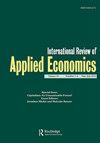Threshold-based asymmetric reactions of trade balances to currency devaluation: fresh insights from smooth transition regression (STR) model
IF 1.6
Q3 ECONOMICS
引用次数: 0
Abstract
ABSTRACT This study sought to ascertain relatively the asymmetric reactions of trade balances to currency devaluation and non-devaluation regimes in sub-Saharan African (SSA) countries between 1981 and 2021 using the smooth transition regression (STR) model. The outcome indicates that, in Ghana, Malawi, and Mozambique, currency devaluation as a change in policy has a major influence on the trade balance; however, in Nigeria, Kenya, and Tanzania, this impact is negligible. Nigeria had the highest gamma coefficient but insignificant, suggesting that policy change has not significantly impacted the country’s trade balance despite the high transition rate. Findings from the devaluation regime revealed that, with the exception of Ghana, all other nations’ real exchange rates are inversely and significantly related to the trade balance. Additionally, it displayed an average threshold parameter of 0.147, indicating that a devaluation of more than 14.7% within a year will deteriorate the trade balance in SSA. The results indicate that the devaluation effects hinge on the structure, macroprudential policies, and infrastructural growth of the nation. The study recommended amongst other things, (i) a robust structural transformation in key sectors (ii) judicious investment in infrastructural development to address the key bottleneck in the quality and quantity of domestic production.基于阈值的贸易平衡对货币贬值的不对称反应:来自平稳过渡回归(STR)模型的新见解
摘要本研究试图使用平稳过渡回归(STR)模型,相对确定1981年至2021年间撒哈拉以南非洲(SSA)国家贸易平衡对货币贬值和非贬值制度的不对称反应。结果表明,在加纳、马拉维和莫桑比克,货币贬值作为一种政策变化对贸易平衡产生了重大影响;然而,在尼日利亚、肯尼亚和坦桑尼亚,这种影响可以忽略不计。尼日利亚的伽马系数最高,但微不足道,这表明尽管过渡率很高,但政策变化并没有对该国的贸易平衡产生重大影响。贬值制度的调查结果显示,除加纳外,所有其他国家的实际汇率都与贸易平衡呈反比,且与贸易平衡有很大关系。此外,它显示了0.147的平均阈值参数,表明一年内贬值超过14.7%将恶化SSA的贸易平衡。结果表明,贬值效应取决于国家的结构、宏观审慎政策和基础设施增长。该研究建议,除其他外,(i)在关键部门进行强有力的结构转型;(ii)明智地投资于基础设施发展,以解决国内生产质量和数量的关键瓶颈。
本文章由计算机程序翻译,如有差异,请以英文原文为准。
求助全文
约1分钟内获得全文
求助全文
来源期刊

International Review of Applied Economics
ECONOMICS-
CiteScore
4.30
自引率
4.50%
发文量
37
期刊介绍:
International Review of Applied Economics is devoted to the practical applications of economic ideas. Applied economics is widely interpreted to embrace empirical work and the application of economics to the evaluation and development of economic policies. The interaction between empirical work and economic policy is an important feature of the journal. The Journal is peer reviewed and international in scope. Articles that draw lessons from the experience of one country for the benefit of others, or that seek to make cross-country comparisons are particularly welcomed. Contributions which discuss policy issues from theoretical positions neglected in other journals are also encouraged.
 求助内容:
求助内容: 应助结果提醒方式:
应助结果提醒方式:


